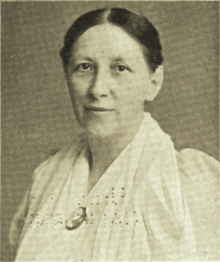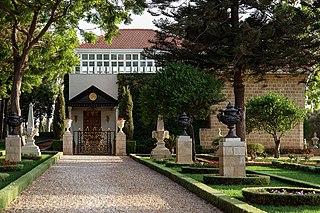
The Baháʼí Faith is a monotheistic religion founded in the 19th century that teaches the essential worth of all religions and the unity of all people. Established by Baháʼu'lláh, it initially developed in Iran and parts of the Middle East, where it has faced ongoing persecution since its inception. The religion is estimated to have approximately 9 million adherents as of 2020, spread throughout most of the world's countries and territories.
Religious conversion is the adoption of a set of beliefs identified with one particular religious denomination to the exclusion of others. Thus "religious conversion" would describe the abandoning of adherence to one denomination and affiliating with another. This might be from one to another denomination within the same religion, for example, from Protestant Christianity to Roman Catholicism or from Shi'a Islam to Sunni Islam. In some cases, religious conversion "marks a transformation of religious identity and is symbolized by special rituals".
Universalism is the philosophical concept and a theological concept within Christianity that some ideas have universal application or applicability.
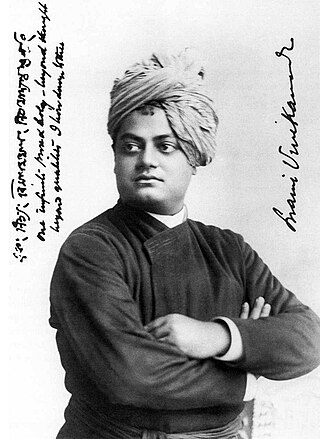
Swami Vivekananda, born Narendranath Datta was an Indian Hindu monk, philosopher, author, religious teacher, and the chief disciple of the Indian mystic Ramakrishna. He was a key figure in the introduction of Vedanta and Yoga to the Western world. He is credited with raising interfaith awareness and bringing Hinduism to the status of a major world religion in the late nineteenth century.
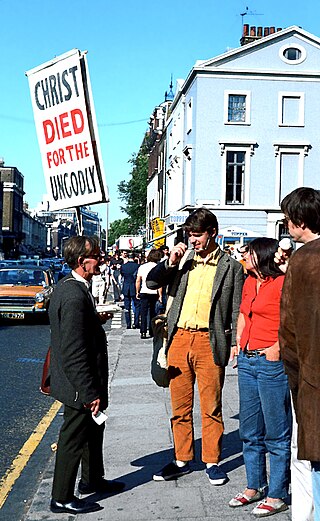
Proselytism is the policy of attempting to convert people's religious or political beliefs. Carrying out attempts to instill beliefs can be called proselytization.

Friedrich Max Müller was a German-born British comparative philologist and Orientalist. He was one of the founders of the Western academic disciplines of Indology and religious studies. Müller wrote both scholarly and popular works on the subject of Indology. He directed the preparation of the Sacred Books of the East, a 50-volume set of English translations which continued after his death.

Ramakrishna Math and Ramakrishna Mission (RKM) is a spiritual and philanthropic organisation headquartered in Belur Math, West Bengal. The mission is named after the Indian Hindu spiritual guru and mystic Ramakrishna. The mission was founded by Ramakrishna's chief disciple Swami Vivekananda on 1 May 1897. The organisation mainly propagates the Hindu philosophy of Vedanta–Advaita Vedanta and four yogic ideals – Jnana, Bhakti, Karma, and Raja yoga. The mission bases its work on the principles of Karma Yoga, the principle of selfless work done with a dedication to God.

The Baháʼí Faith is an independent world religion that originated in Iran in the 19th century, with an emphasis on the spiritual unity of mankind. Although it came from Islamic roots, its teachings on the unity of religion and its acknowledgement of Krishna as a divine Manifestation of God have created a bridge between religious traditions that is accepting of Hinduism.

Sister Nivedita was an Irish teacher, author, social activist, school founder and disciple of Swami Vivekananda. She spent her childhood and early youth in Ireland. She was engaged to marry a Welsh youth, but he died soon after their engagement.
Unity of humanity is one of the central teachings of the Baháʼí Faith. The Baháʼí teachings state that since all humans have been created in the image of God, God does not make any distinction between people regardless of race or colour. Thus, because all humans have been created equal, they all require equal opportunities and treatment. Thus the Baháʼí view promotes the unity of humanity, and that people's vision should be world-embracing and that people should love the whole world rather than just their nation. The teaching, however, does not equate unity with uniformity, but instead the Baháʼí writings advocate for the principle of unity in diversity where the variety in the human race is valued.

Roderick Ninian Smart was a Scottish writer and university educator. He was a pioneer in the field of secular religious studies. He is best known for his seven-dimensional definition of religion.
Secular ethics is a branch of moral philosophy in which ethics is based solely on human faculties such as logic, empathy, reason or moral intuition, and not derived from belief in supernatural revelation or guidance—a source of ethics in many religions. Secular ethics refers to any ethical system that does not draw on the supernatural, and includes humanism, secularism and freethinking. A classical example of literature on secular ethics is the Kural text, authored by the ancient Indian philosopher Valluvar.

Green Acre Baháʼí School is a conference facility in Eliot, Maine, in the United States, and is one of three leading institutions owned by the National Spiritual Assembly of the Baháʼís of the United States. The name of the site has had various versions of "Green Acre" since before its founding in 1894 by Sarah Jane Farmer.
"The Will to Believe" is a lecture by William James, first published in 1896, which defends, in certain cases, the adoption of a belief without prior evidence of its truth. In particular, James is concerned in this lecture about defending the rationality of religious faith even lacking sufficient evidence of religious truth. James states in his introduction: "I have brought with me tonight ... an essay in justification of faith, a defense of our right to adopt a believing attitude in religious matters, in spite of the fact that our merely logical intellect may not have been coerced. 'The Will to Believe,' accordingly, is the title of my paper."

Christianity is the predominant religion in Kiribati, with Catholicism being its largest denomination.
In religion, a covenant is a formal alliance or agreement made by God with a religious community or with humanity in general. The concept, central to the Abrahamic religions, is derived from the biblical covenants, notably from the Abrahamic covenant. Christianity asserts that God made an additional covenant through Jesus Christ, called the "New Covenant".
The Baháʼí Faith in Barbados begins with a mention by ʻAbdu'l-Bahá, then head of the religion, in 1916 as the Caribbean was among the places Baháʼís should take the religion to. The first Baháʼí to visit came in 1927 while pioneers arrived by 1964 and the first Baháʼí Local Spiritual Assembly was elected in 1965. Hand of the Cause ʻAlí-Muhammad Varqá attended the inaugural election of the Barbados Baháʼís National Spiritual Assembly in 1981.

John Henry Barrows (1847–1902) was an American clergyman of First Presbyterian Church (Chicago) and Chairman of the 1893 General Committee on the Congress of Religions. He claimed that Abraham Lincoln had become a Christian in 1863.
The scholarly study of the Baháʼí Faith, its teachings, history and literature is currently conducted in a variety of venues, including institutes of the Baháʼí administration as well as non-affiliated universities. Some scholars study some aspect of the Baháʼí Faith as part of research on related matters while others engage in Baháʼí studies as a primary focus of their research. Scholars' comments on the religion and its predecessor Bábism date back to at least 1845, the year after its founding. Initially, they were often Orientalists or Christian missionaries but through time both Baháʼís and non-Baháʼí researchers have addressed the religion especially in tune with the growth of the religion, which has been called significant.
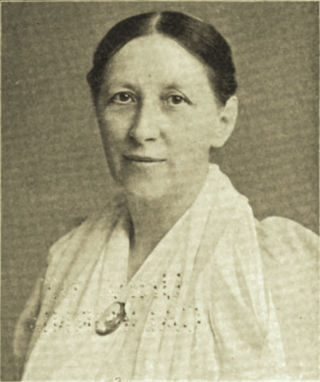
Sarah Jane Farmer (1847-1916) founded the Greenacre Conferences in Eliot, Maine, U.S. After her death, Greenacre became the Green Acre Baháʼí School.
